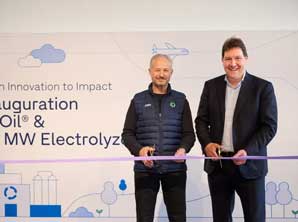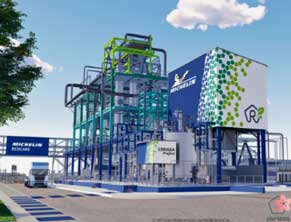Green news: OMV inaugurates ReOil/electrolyser facilities in Vienna; Avantium in Michelin-led consortium for biobased chemical HMF

Austrian chemical firm OMV recently officially inaugurated its flagship ReOil and electrolyser facilities at the Schwechat refinery near Vienna. The proprietary ReOil chemical recycling plant converts hard-to-recycle plastics into virgin-quality products, driving circularity and reducing environmental impact.
The new 10 MW electrolyser facility has a production capacity of up to 1,500 tonnes/year of green hydrogen and is the biggest of its kind in Austria.
Alfred Stern, Chairman of the Executive Board/CEO of OMV: “This inauguration marks a decisive step in our Strategy 2030. It is driven by one clear ambition: to become an integrated sustainable chemicals, fuels, and energy company, while remaining steadfast in our commitment to achieving net-zero emissions by 2050. Such systemic change requires collaboration across the entire value chain, which is why I am delighted to commemorate this milestone with all those who contribute and share our vision to shaping a more sustainable future.”
Stern added: “As customer needs continue to evolve, our two transformative technologies empower us to meet both current and future demands. By strengthening the link between refining and chemical production, we unlock greater efficiency, flexibility, and sustainability. This is how we turn molecules into value — and strategy into meaningful impact.”
Dutch polymer materials firm Avantium has been awarded a EUR200,000 grant by the EU Horizon Europe program to participate in a consortium for the large-scale production of the biobased chemical 5-Hydroxymethylfurfural (5-HMF). The consortium, consisting of 12 European partners and led by Michelin Engineered Polymers, aims to construct and operate an HMF flagship plant to demonstrate the wide range of applications for HMF. The project also plans to assess synergies with Avantium’s FDCA flagship plant.

French tyre company Michelin recently announced what it says will be the construction of the world’s first industrial demonstration unit for the 5-HMF green chemistry-based molecule. To be located on the Osiris platform in Péage en Roussillon, France, it will have a capacity of 3,000 tonnes/year, making this site the largest in the world for this molecule.
This project represents a total investment of EUR60 million, partly subsidised by the ADEME in France and the CBE JU at European level. It will allow for the creation of approximately 30 direct jobs and should begin its activities during 2026.
HMF is a biobased chemical derived from sugars, such as fructose. Due to its versatility and ability to replace a broad range of conventionally produced building blocks, HMF serves as a key intermediate between biomass and biochemicals. Despite its significant potential, there are currently no large-scale industrial processes to produce HMF. Michelin Engineered Polymers, specialised in developing advanced polymer materials, plans to engineer and construct an industrial-scale HMF plant under the grant program.
The grant consortium will also explore a wide range of bio-based sustainable applications for HMF, for example be used as an intermediate in the production of FDCA. This creates a direct link between Michelin's planned HMF plant and Avantium’s FDCA Technology. The foreseen synergies will help to create an integrated and sustainable European production ecosystem that reduces environmental impact and strengthens the economic resilience of the European chemical industry.
The consortium, known under the name CERISEA has received a EUR20 million EU Horizon Europe grant in total. Michelin Engineered Polymers will lead the consortium, which includes Avantium and ten other industry and academic organizations: IFP Energies Nouvelles, ADM Bazancourt Sasu, Arkema, Kraton Chemical BV, Université de Technologie de Compiègne (UTC), Centre National de la Recherche Scientifique (CNRS), IFEU - Institut für Energie- und Umweltforschung Heidelberg, Instituto Tecnológico del Embalaje, Transporte y Logística, Energieinstitut an der Johannes Kepler Universität Linz Verein, and Bioeconomy for Change.
Already used in the Michelin ResiCare resins, which are used in adhesive and bonding applications. its availability on an industrial scale will allow a potential market of over 40,000 tonnes to open by 2030, through the creation of a European industry, Michelin adds.
Michelin says the unit is in line with its strategy to innovate and its ability to develop other applications beyond tyres.
Already used in the manufacture of non-toxic adhesive resins developed by Michelin ResiCare, this molecule allows these resins to reduce operator and consumer exposure to harmful products. The production of this initial industrial scale unit will allow for safeguarding Michelin ResiCare’s supply and for lowering costs.
It also paves the way for the marketing of new materials in a variety of sectors, such as cosmetics, agriculture, industry, construction, transport, aeronautics, or electronics, as well as in many other fields of application. The projects launched demonstrate a potential market of over 40,000 tonnes by 2030.
Provision has been made for 20,000-tonne units to be duplicated via a license system, in order to develop a production network for this bio-sourced molecule, in conjunction with the project’s industrial partners.
(PRA)SUBSCRIBE to Get the Latest Updates from PRA Click Here»









